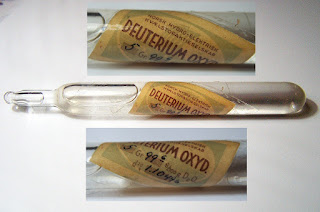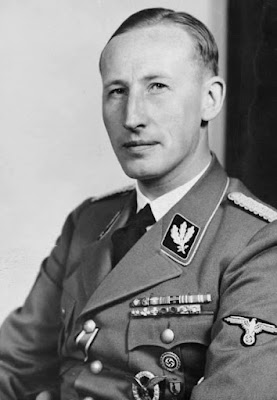 |
| A picture of the D-Day landings. It's in black and white, so you know it isn't a Call of Duty screenshot. |
In comes the Ministry.
In the months prior they had been damaging railways and roads to stop the Nazis from reaching the beachheads. The prevention of movement was always of the utmost importance, as when you're as small a force as they were (about 300 men landed in France from the Ministry) they weren't going to be taking out any part of the army of real significance. They were simply a harassment force.
One of the most effective delay tactics was used against an incredibly effective tank division called Das Reich. Equipped with 1,400 tanks and 15,000 soldiers, the division was led by General Heinz Lammerding, a proven German success story. Cutting his teeth at the eastern front (the scariest front!) he earned two iron crosses. If he was to make it to the beach he would cause a tremendous amount of trouble for the Allied invasion force. His tanks were set to arrive at the beach from their setting off point in only 72 hours.
Thinking fast, a member of the Ministry came up with a brilliant plan to slow the tank advance. The tanks weren't actually the ones travelling along the roads. Their treads rip roads to pieces, and by the time the back of the line would be pressing forward the roads would be in far too rough of shape to effectively move across. Instead, they were riding atop tank transporters, large trucks used to be softer on the roads but still move the tanks at a good clip. The plan for the sabotage was to sneak into the German camp and plant carborundum, a material that is hard and abrasive enough to scratch any crystal except for diamond, into the pipes of the transporters. In what must have been an exceedingly nervy bit of vandalism, the men managed to take out enough of the transporters to halt the entire force. In turn, they were put on an entirely different route that would take much, much longer.
But that wasn't all. Along the new tarmac path they had to take, the Ministry would set up well in advance and knock down a few trees to hinder their path. That doesn't initially sound like much, but they would have to bring a vehicle to the front to move the trees that often took as long as four hours to reach it. Shortly down the line they did it again, except this time they had another surprise in store. They set up tank mines, blowing up the tree-removing vehicle and making the road all but impassable. Eventually they got another vehicle to do the job, but not after a great deal of effort and, more importantly, a great deal of time. The group would do the same plan a few more times, causing further delays due to the Germans having to check for mines upon reaching the fallen trees.
Remember that 72 hour estimated arrival time? All the delays pushed it back to seventeen days. By then the beachhead was secured, and the arrival of General Lammerding's tanks had missed their point of optimal effectiveness.
 |
| Loading a tank onto one of the transporters, a scene where many "tanks for the help" puns were made. |
Once that was done and the Allies were on the march forward, there was little for the Ministry to do. They were a harassment force for an army that was powerful and secured, and when that army was on the run and dwindling they lost their place in the war. In essence, their job was already done by the time the Allies were moving to clean up the last of the Nazi regime. Their role in getting them there, however, was incredible. All in all, they made 1.5 million sticky bombs; one million puffball explosives, two million anti-aircraft frag bombs, and a plethora of booby traps and specialist explosives. It's an amazing total considering the Ministry's annual budget was only £40,000 and consisted of only 250 people at headquarters.
This blog series covers only some of the most interesting stories. I left out some important ones, like the men taking out factories and leading special assaults. I also didn't get a chance to discuss how the American version of the camp, created in Canada to avoid reprisals as America had not yet officially entered the war at the time, laid the groundwork for the CIA. The book I've read for this (mentioned at the bottom) likely didn't discuss every single mission they went on either. That's not to mention all the individual inventions the top of the heap made along the way (Jeffries' submarine bomb had a piece that was critically important in the creation of the first nuke, as well). It's really an incredible amount of work that was put out by such a small team.
That's the thing about World War II. You hear about the big battles, the massive clashes of machines and men, the colossal invasion forces... but within all of those there are these individual stories that are fascinating. My dad mentioned to me how this should be made into a T.V. series, and after all they've done that would be a fitting tribute. It plays so well for it: exciting, individual missions; a cast of eccentric characters; Gubbins hired many female staff, making it so it wouldn't just be a male cast which people would undoubtedly whine about; and all of this with the backdrop of real differences made in World War II.
Heck, it's got to be better than Young Sheldon.
---------------------
The information from this blog was taken from Giles Milton's book Churchill's Ministry of Ungentlemanly Warfare: The Mavericks who Plotted Hitler's Defeat. It's an incredible book, and reads much better than what I've done here. I can't recommend it enough.












